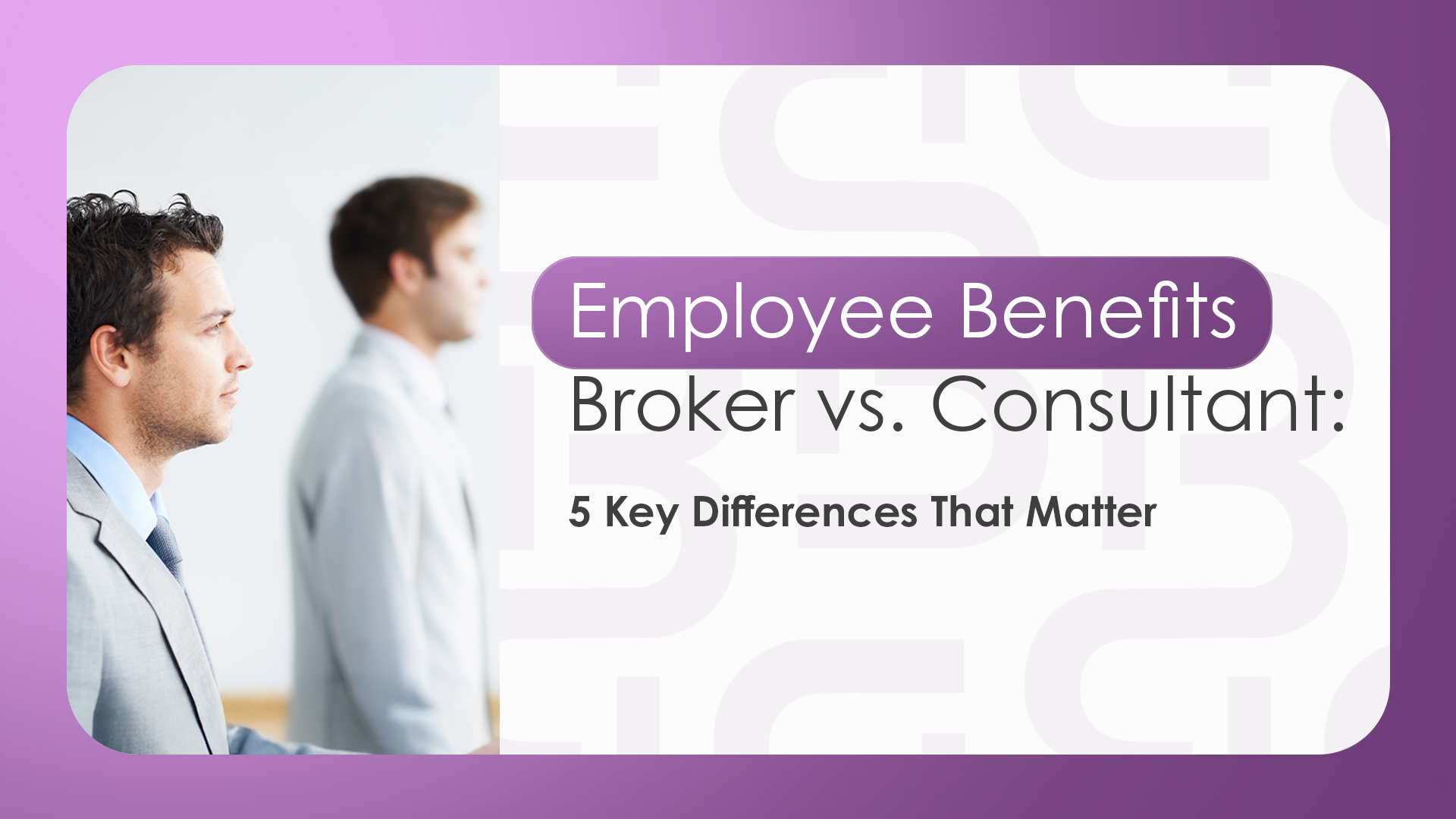When your company is ready to build or rethink its employee benefits plan, one of the most important choices you’ll make isn’t about coverage. It’s about who’s helping you make those decisions: an employee benefits broker or an employee benefits consultant.
The two terms are often used interchangeably, but they’re not the same. The difference comes down to approach, independence, and the kind of long-term value your organization is looking for.
In this article, we break down the five key differences between a broker and a consultant—so you can decide which partner is the right fit for your team.
- Strategic Approach to Plan Design
Brokers often operate on a product-first basis. They work with a handful of insurance carriers and help you choose from pre-set plan options that fit your size and budget.
Consultants, on the other hand, begin with your goals. They take the time to understand your workforce, culture, and business trajectory—then design a benefits strategy to match. The outcome isn’t just coverage. It’s alignment.
Why it matters: If you want to differentiate your benefits offering, a one-size-fits-all plan won’t cut it. Consultants build plans that evolve with your needs.
- Level of Independence
Brokers are typically paid through commissions by the insurers they represent. While this doesn’t inherently mean biased advice, it can create a conflict of interest—especially if the broker is tied to just a few providers.
Consultants are often compensated through fee-based models or disclosed commission agreements, and they work with multiple carriers without preference. The focus is on what’s best for your business, not theirs.
Why it matters: Independence ensures you’re choosing from the full market, not a limited shelf of options.
- Breadth of Advisory Services
Most brokers assist with quoting, enrollment, and annual renewals. Their role is primarily transactional.
Consultants go further. They provide ongoing advice, employee communication strategies, cost-containment tactics, benchmarking analysis, and even education sessions for HR and finance teams. Many also offer predictive analytics and ED&I planning.
Why it matters: If you want your benefits plan to be a competitive advantage—not just a checkmark—consultants bring the tools to make that happen.
- Client Relationship & Support Model
Brokers tend to operate on a reactive basis. You may only hear from them at renewal time or when there’s an issue to resolve.
Consultants work as an extension of your internal team. They stay in close contact throughout the year, proactively monitoring plan performance, ensuring compliance, and helping you prepare for upcoming changes in legislation or workforce needs.
Why it matters: Proactive service means fewer surprises—and more value.
- Long-Term Partnership vs. Short-Term Transaction
Choosing a broker may be suitable for simple plans with minimal complexity. But if you’re managing a growing team or want to align benefits with broader talent goals, a consultant offers the ongoing relationship and insight you need.
Why it matters: A benefits partner should grow with your business—not hold it back.
Summary Table: Broker vs. Consultant at a Glance
| Aspect | Employee Benefits Broker | Employee Benefits Consultant |
| Plan Design | Product-first, insurer-based packages | Strategy-first, goal-aligned custom plans |
| Independence | Often tied to limited carriers | Fully independent, carrier-agnostic |
| Services Provided | Transactional: quotes, renewals | Strategic: analytics, communication, compliance |
| Support Model | Reactive, limited touchpoints | Proactive, year-round partnership |
| Long-Term Value | Good for basic coverage needs | Built for growth, retention, and long-term strategy |
When Should You Choose a Consultant Over a Broker?
Choosing between a broker and a consultant often depends on your organization’s size, complexity, and long-term vision. If you’re running a small team with limited needs and minimal administrative demands, a broker may offer the quick setup and transactional support you need.
But if you’re:
- Growing quickly or scaling across multiple locations
- Competing for top-tier talent in a competitive hiring market
- Prioritizing diversity, inclusion, and employee wellbeing
- Seeking long-term cost control and performance tracking
- Wanting a plan that evolves with your company over time
Then working with a consultant makes more sense. Consultants help you align your benefits strategy with your broader goals, ensuring your investment pays off today—and in the years ahead.
So Which Is Right for You?
If you’re looking for a quick quote and basic support, a broker may be enough. But if your goal is to build a high-impact, sustainable benefits strategy—especially in today’s competitive talent landscape—a consultant can offer the depth, flexibility, and foresight to get you there.
How Benchmark Benefits Can Help
At Benchmark Benefits, we’re proud to serve as strategic consultants—not just intermediaries. We design, implement, and manage total compensation programs that reflect your organization’s values, mission, and workforce realities.
Our team brings decades of experience, access to market-wide providers, and a flat service model that keeps our experts closely involved in every step of your journey.
Whether you’re just getting started or looking to level up your current benefits approach, we can help you build a plan that works for today—and evolves with tomorrow.
👉 Looking for a benefits consultant that brings more to the table? Contact Benchmark Benefits today.









